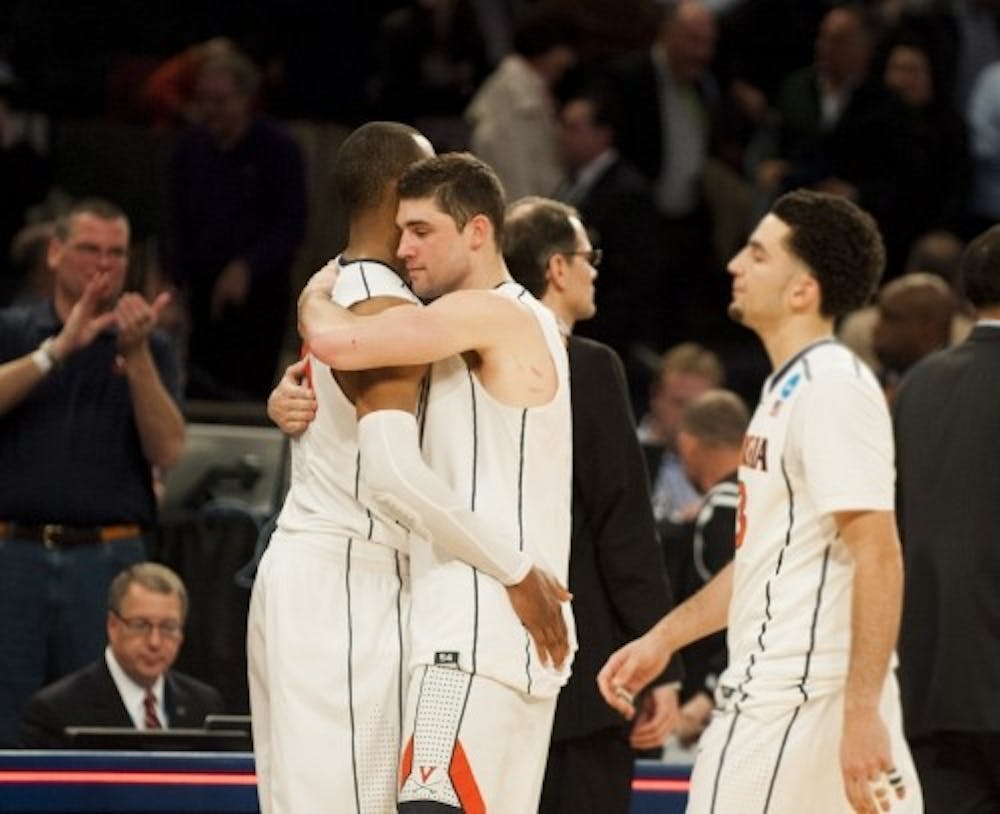In many ways, Virginia’s loss last week to Michigan State felt like a failure that wrought a premature end to one of the best seasons in program history. On the national stage, Michigan State suffocated the Cavaliers’ offense and their Final Four dreams in the final two minutes at Madison Square Garden.
The final minute passed excruciatingly slowly, as Spartan after Spartan defended, rebounded and knocked their free throws just well enough put the game out of reach after giving Virginia fans the faintest, cruelest hope that a miracle might salvage their team’s tournament.
Tony Bennett implored his players to remain focused all season, promising them that they could celebrate their many successes after the NCAA Tournament was over.
But when the final buzzer sounded in Midtown, I for one didn’t feel like celebrating.
A one-possession loss is the most painful of all. Undoubtedly every Virginia player replayed each possession in their heads over and over, dreaming of what they could have done differently and willing to give anything to change it.
Had Michigan State gone on to win the National Championship, as predicted by many a pundit, perhaps the game would have been remembered as the unfortunate result of seeding error by the Committee. Virginia fans could take comfort in having someone else to blame; first the referees, for the no-call when Teven Jones ended up on the floor at the end of the game, and now the Selection Committee.
But the Spartans didn’t win it all. They looked sluggish in the next round, hungover from the Virginia win, and fell to the Shabazz Napier one-man show with a trip to the Final Four on the line.
The Cavaliers didn’t lose to the grossly under-seeded, eventual National Champions — they just happened to meet a good Michigan State team on a night where they couldn’t hit anything at times, while things just clicked for Branden Dawson and the Spartans.
So how do we remember this season?
It won’t be recalled fondly by basketball fans across America like the years of Ralph, where the team was consistently highly ranked and its star player was plastered on the covers of Sports Illustrated.
No, this Virginia team was our little secret — known by those in Charlottesville to be lethal to opponents, but dismissed nationally as an aberration that played an “unbalanced conference schedule” and lacked a true star player.
And it will remain that way. Ten years from now, few outside of those of us who were here will reflect on what dominant players Joe Harris and Akil Mitchell were.
“A simple look at the stats will tell you these guys weren’t any good,” they’ll say. “Harris averaged just 12 points per game his senior season — down more than four from the year before. There are guys who score twice that much!
“Mitchell, on the other hand, virtually forgot how to score after his junior season — his average down from 13 points per game to a paltry 6.8, while his rebounds per game also declined from nine to seven.”
Their numbers won’t tell the story, but those two should go down as two of the most important players in Virginia basketball history.
They were the two who stuck it out through thick and thin when four others from their class decided they’d had enough of Bennett’s way. They were the two who definitively showed that Bennett’s five pillars — humility, passion, unity, servanthood and thankfulness — could be successful in the era of astronomically hyped recruits and larger than life one-and-done players.
Harris, who Justin Anderson emphasized could easily lead the team in shots and scoring, sacrificed minutes and scoring to do whatever it took to win. Mitchell relinquished his almost equally sexy role as the team’s second-leading scorer to rebound, set screens and stick to opposing offensive players closer than a pack of first-year girls headed to Rugby Road.
But despite the sacrifices they made, the two never stopped being leaders. How many times did Harris step up to hit a timely 3-pointer, or Mitchell come up with a huge defensive stand or pump the team up in the huddle during the postseason run?
And arguably even more significant, they set the standard for the rest of the team. They gave the otherwise youthful roster a taste of success — a taste that will drive those who remain to work feverishly toward surpassing last year’s mark.
So we bid farewell to Harris and Mitchell and recognize what the program is losing in terms of offensive and defensive production and leadership. But a thought that was likely not at the forefront of anyone’s mind while Harris and Mitchell discussed the end of their collegiate careers in the bowels of Madison Square Garden is how much those two will still be with us next season and beyond.
As I left a somber locker room that seemed dazed by defeat — who could blame them, they didn’t lose very often — that Saturday after midnight, I had to turn and thank Akil, sitting alone, for what he’d done for the program and the school — not just in his four years, but for the years to come as well.
No two players have been as vital in shaping Virginia basketball under Bennett — and maybe no other pair of players ever will be. And while Harris and Mitchell’s senior season may have been their last, it was just the beginning for the rebirth of the Virginia basketball program.
Armed with postseason experience, returning considerable depth and reloading with three talented recruits, the Cavaliers will again be a forced to be reckoned with in the next half-decade or more, I reckon.
Just don’t forget the guys who started it all.







